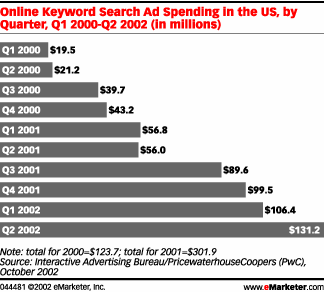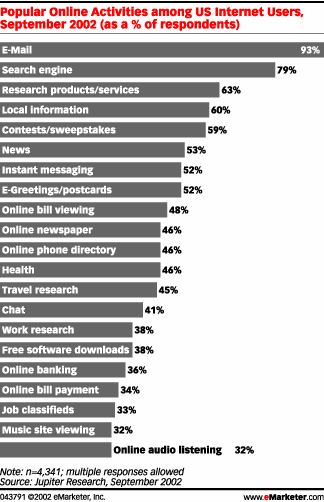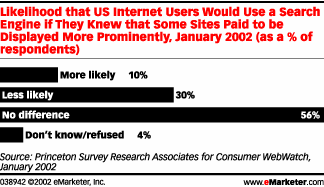Search Engine Marketing: Good News in a Down Economy

Despite the reduced revenue estimates for online advertising, one vehicle that bucks the ad-spend trend is search engine marketing (called ?keyword search? by the Interactive Advertising Bureau). For example, spending for this format jumped from $123.73 million in 2000 to $301.91 million in 2001—a 144.0% gain. One reason for this growth: Companies are finding that search engine marketing is today?s best interactive tool for driving carefully targeted audiences to websites.
Looking at the IAB spending figures on a quarterly basis, you can see the nearly steady rise up to $131.2 million in the second quarter of 2002.

The quarterly growth rate figures reveal some large jumps, such as 59.9% in the third quarter of last year. And even in the current recessionary market, keyword search revenues increased by 7.0% and 23.3%, respectively, in Q1 and Q2 2002.
Search engines and search portals are vehicles for at least three forms of interactive marketing, two of which are also profitable for the search site itself:
1. Paid placement. With this ad model, companies bid to show up high on the list of search results at a search engine site, and the highest bidder gets the top slot.
2. Paid inclusion. With this ad model, companies pay search engines to visit their sites more frequently and dig deeper into their content, therefore ensuring their companies get listed properly. In another version of this model, search sites charge fees to include company websites in a web directory that used to include them for free.
3. Search engine optimization. With this ad model, companies make ?detailed modifications to a site?s contents and technical architecture in order to enable it to rank higher in the search results for a given set of keywords,? according to avant|marketer.
Considering the popularity of online searching, the growing use of search sites for marketing is nearly a no-brainer. Advertisers find that keyword searches are an effective way to position their brands and products—?effective? since next to e-mail, the most popular activity for US internet users is searching, according to 79% of respondents in a recent Jupiter Research survey.

Consumers don?t seem to mind paid placement ads either. A 56% majority of respondents to a Consumer WebWatch survey earlier this year said that even if they knew that some companies paid to be listed higher in search result, it would make no difference to them—they?d still use the particular search site. And 10% even said they?d be more likely to use the site.

However, watch that 30% of US internet users who said they?re be less likely to use search sites with paid search listings. That?s too large a segment to ignore, and if not handled carefully, it could undermine the credibility that most search sites currently have.
Another caveat to keep in mind: Research from eMarketer has shown that without the right choice of keywords, advertisers can be getting unqualified visitors to their websites, wasting marketing dollars.
Source:
http://www.emarketer.com/news/article.php?1001881&c=newsltr&n=analysis&t=ad
Plaats reactie
Je moet ingelogd zijn op om een reactie te plaatsen.